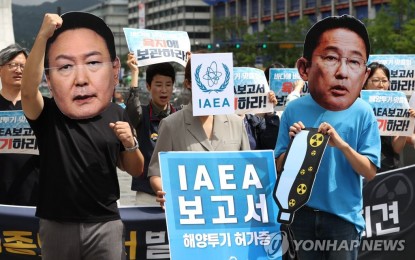
PROTEST. Protestors wearing masks of South Korean President Yoon Suk Yeol (left) and Japanese Prime Minister Fumio Kishida take part in a rally in Seoul on Wednesday (July 5, 2023), to condemn the International Atomic Energy Agency for its conclusion that Japan's planned discharge of treated radioactive water from the crippled nuclear reactors in Fukushima into the ocean is consistent with safety standards. (Photo from Yonhap)
WASHINGTON – The United States welcomes the outcome of a review by the International Atomic Energy Agency (IAEA) on the planned discharge of treated water from Japan's Fukushima nuclear power plant, a state department spokesperson said Wednesday.
US State Department Spokesperson Matthew Miller noted that Japan has been transparent about its plan to release treated water from the damaged Fukushima plant.
"The United States welcomes the International Atomic Energy Agency's (IAEA) report noting Japan's plans to release treated water from the Fukushima Daiichi nuclear site are safe and consistent with internationally accepted nuclear safety standards," Miller said in a released statement.
"Since the 2011 nuclear accident, Japan has proactively coordinated with the IAEA on its plans and conducted a science-based and transparent process. We look forward to Japan's continued cooperation with the IAEA as its process moves forward," he added.
The released statement comes after an IAEA task force of international experts concluded after a two-year review that the planned discharge of treated water would have "negligible" impact on people and the environment.
Many people, however, have expressed concerns that the discharge of radioactive wastewater may cause serious long-term consequences even after treatment, while some even argued that the IAEA task force may have failed to independently verify the safety of the Japanese plan to discharge treated water.
Another state department spokesperson has insisted that "science" should dictate the planned release of treated water.
"The task force assessed the plans for the release of treated water against IAEA nuclear safety standards, which it developed in consultation with all IAEA member states, including many small island developing states, and which reflect international consensus on what constitutes a high level of safety for protecting people and the environment from harmful effects of ionizing radiation," the spokesperson told Yonhap News Agency earlier, asking not to be identified.
"We understand Japan has also consulted scientists and partners from across the Indo-Pacific region on its plans," the spokesperson had added. (Yonhap)
